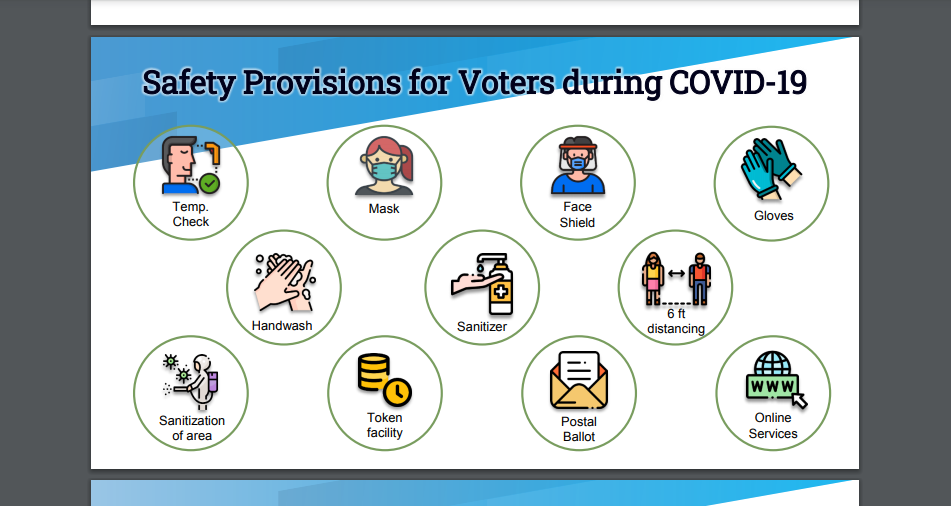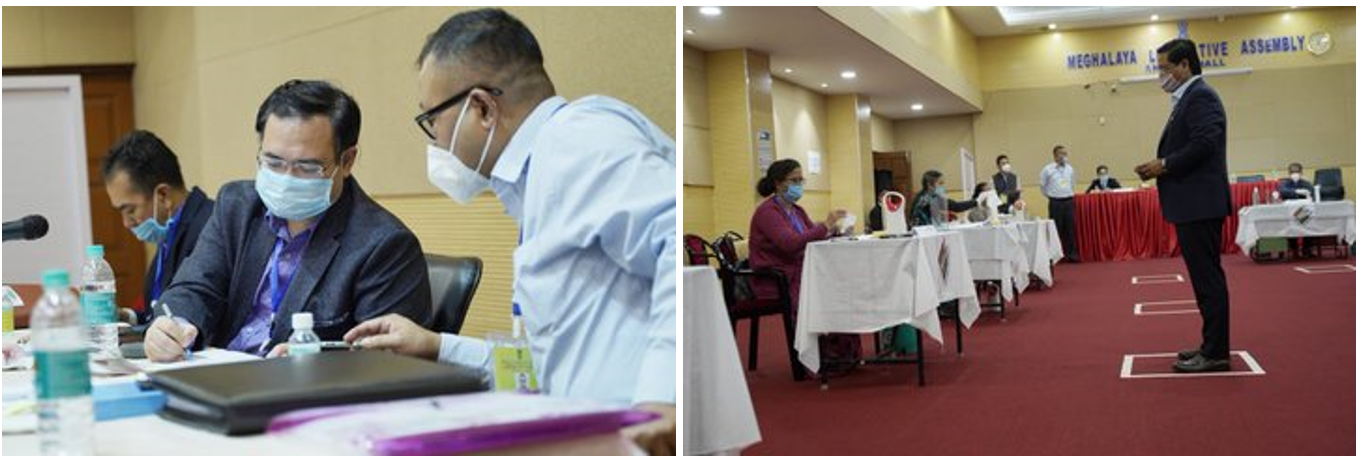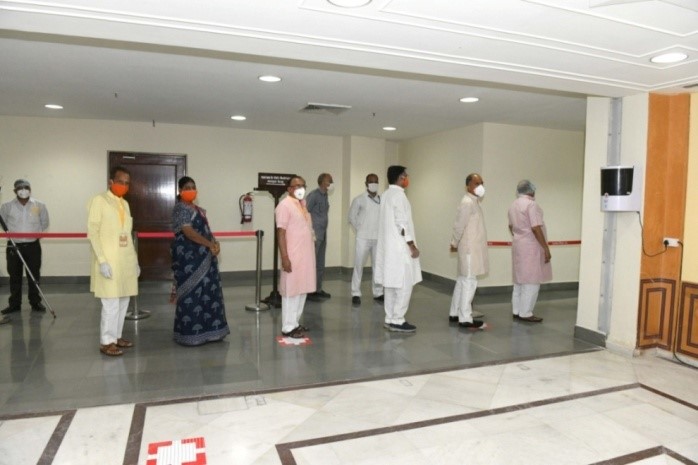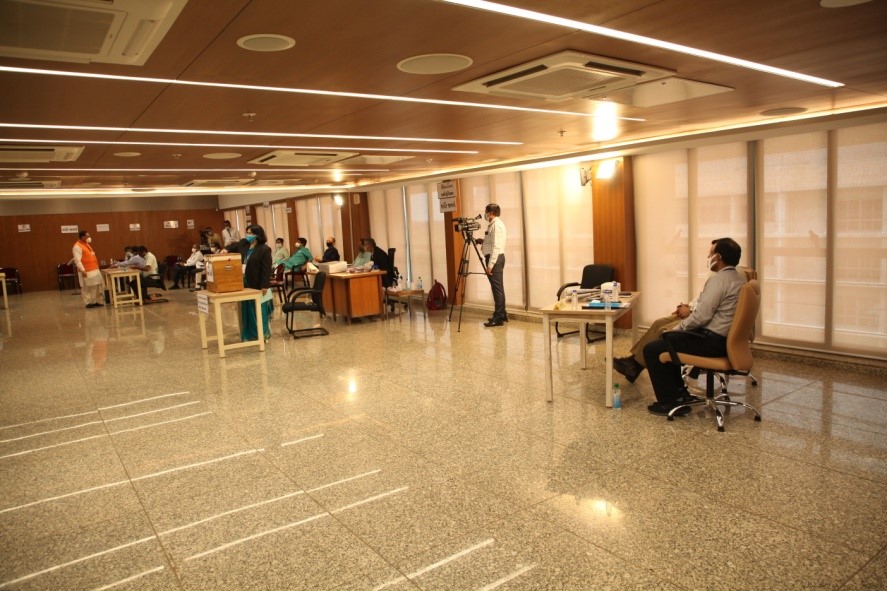
Global Knowledge Network On Voter Education - learning from each other
Elections are an integral component of a democracy. The outburst of the COVID-19 pandemic has not only changed lives socially and economically but also surfaced novel challenges upon the global democratic powers across the world. It has shaken all pillars of society and in such a scenario, protecting the rights of citizens and keeping the wheel of democracy rolling is one of the biggest challenges.
As the world moves to a ‘new normal’, there has been a paradigm shift in election management procedures and policies. Approximately, a hundred national and sub-national elections have been postponed across the world in view of COVID-19, even as over fifty elections have been successfully conducted in different countries as per schedule or with some adjustments in electoral schedules. Pioneers among these countries include Republic of South Korea, Taiwan, Mongolia, Australia, Dominican Republic and few others.
Election Commission of India started monitoring the impact of the pandemic on elections right from the very beginning. The elections conducted and the elections postponed in different countries as well as strategies adopted by them, have been studied carefully as also the analysis presented by the expert international institutions such as International IDEA, IFES etc. has been deliberated upon by officials from Election Commission of India and numerous stakeholders.
The COVID -19 Safe Election Protocols require additional advance planning in terms of officials, materials, and training besides voter education/stakeholder education especially in view of scale of operations for elections in India. To further evaluate the challenges, a consultation with stakeholders was organized where each aspect of the election was discussed, carefully deliberated and the inputs from International bodies shared with them. Thereafter, a new strategy for safe and secure elections was devised.
The routine Biennial Elections for 18 seats of the Rajya Sabha were scheduled on March 26, 2020. However, due to the pandemic, elections were postponed to and rescheduled to May 21, 2020 in Maharashtra and June 19, 2020 in four Indian states namely Meghalaya, Rajasthan, Madhya Pradesh and Gujrat. Following is a brief overview of the planning and specific measures taken during Legislative Elections across Indian states.
Biennial Elections
Maharashtra
 Maharashtra conducted their biennial election to the Rajya Sabha for nine seats on May 21, 2020. Appropriate directives were given to all the concerned officials related to the elections in the State. The officers and voters present strictly abided by the following guidelines:
Maharashtra conducted their biennial election to the Rajya Sabha for nine seats on May 21, 2020. Appropriate directives were given to all the concerned officials related to the elections in the State. The officers and voters present strictly abided by the following guidelines:
- Mandatory use of face mask
- Scanning through digital non-contact infrared thermometer
- Register of voters names and mobile numbers at the entrance of polling station
- Maintaining social distancing with a minimum distance of 6 feet from each other
Meghalaya
 In Meghalaya, COVID-19 precautions were supervised by the Senior Nodal Medical Health Officer deputed by the State Government. Carefully prepared ready-reference pocket guides featuring Do’s and Don’ts, minute-to-minute polling sequence schedules, and additional COVID-19 containment arrangements for polling officials were developed and circulated to Polling officials. Voters were timely informed about new protocols and guidelines through the mainstream media and via various customized communications materials. Major emphasis was given to ensuring the following to ensure safe elections:
In Meghalaya, COVID-19 precautions were supervised by the Senior Nodal Medical Health Officer deputed by the State Government. Carefully prepared ready-reference pocket guides featuring Do’s and Don’ts, minute-to-minute polling sequence schedules, and additional COVID-19 containment arrangements for polling officials were developed and circulated to Polling officials. Voters were timely informed about new protocols and guidelines through the mainstream media and via various customized communications materials. Major emphasis was given to ensuring the following to ensure safe elections:
- Area Sanitization
- Thermal Testing
- Greeting Etiquette
- Masks
- Hand Sanitising
- Physical Distancing
Rajasthan
 To ensure the safety of voters, a separate entry and exit, facility for thermal screening, appropriate queue-position markings to ensure social distancing, mandatory face masks, hand gloves and sanitization of body were put in place. The Secretariat Complex, waiting areas and the polling room were also thoroughly sanitized one day in advance. Media personnel were restricted at designated spots and requested to stay in small groups while following social distancing norms.
To ensure the safety of voters, a separate entry and exit, facility for thermal screening, appropriate queue-position markings to ensure social distancing, mandatory face masks, hand gloves and sanitization of body were put in place. The Secretariat Complex, waiting areas and the polling room were also thoroughly sanitized one day in advance. Media personnel were restricted at designated spots and requested to stay in small groups while following social distancing norms.
Madhya Pradesh
For the seamless conduct of polls, key initiatives such as making special arrangements for voting in a big hall, ensuring dedicated seating for each voter were undertaken. A COVID-19 positive voter and the entire polling team dealing with him/her were provided PPE kits, and the polling station was also thoroughly sanitised before and after his/her vote
Gujarat
 Separate halls were arranged for waiting electors and media persons and two rooms were exclusively kept for isolation for any elector with COVID-19 or suspected to be COVID-19 case. A separate passage from the entry was planned for any elector with COVID-19 and for electors who were detected with a temperature higher than normal during thermal screening. Apart from these, sanitizers and the provision of running water to wash hands were adequately put in place. Medical and paramedical teams were also kept on standby at the polling venue to attend any emergencies.
Separate halls were arranged for waiting electors and media persons and two rooms were exclusively kept for isolation for any elector with COVID-19 or suspected to be COVID-19 case. A separate passage from the entry was planned for any elector with COVID-19 and for electors who were detected with a temperature higher than normal during thermal screening. Apart from these, sanitizers and the provision of running water to wash hands were adequately put in place. Medical and paramedical teams were also kept on standby at the polling venue to attend any emergencies.
Knowledge sharing between EMBs
Knowledge and experience sharing by Electoral Management Bodies is a quintessential aspect in the current times to safeguard the democratic rights of citizens without compromising on their health. Hence Election Commission of India organized an International Webinar on ‘International Experiences in Conducting Elections in 2020 during COVID-19’ on September 21, 2020 where the entire A-WEB Community of 106 countries and 16 Partner Organizations were invited. International Experiences on conducting elections during COVID-19 were shared by the eminent speakers and the A-WEB Community expressed its resolve and determination to support electoral democracy and fight the challenges thrown up by the pandemic.
General Election to the Legislative Assembly of State of Bihar:
Moreover, General Election to the Legislative Assembly of State of Bihar were announced by the ECI on September 25, 2020. Bihar State Legislative Election (along with other Assembly by elections) is one of the biggest electoral exercises taking place during COVID-19 times. Following are the comprehensive guidelines*:
General
- Several earlier instructions of ECI had to undergo revision and fresh instructions issued.
- All election related processes and premises infused with standard norms of wearing of masks, social distancing, thermal scanners at entry points and thorough sanitization of places and equipment.
- As far as practicable, large size halls to be used for election related activities
- Training to be organized in online mode and /or decentralized manner in large halls
- Nodal Health Officer designated for each state, district and constituency to oversee COVID-19 related arrangements
Electors:
Number of electors in each polling station reduced from 1,500 to 1,000 to ensure social distancing and ease of voting for elderly and vulnerable electors
The decision of reducing electors at polling stations from 1500 to 1000 will lead to additional 34,000 (approx.) polling stations in the upcoming Bihar elections (45% above the existing polling stations). This will lead to a massive logistical movement of 1.8 lakh polling personnel and resources for a total of 1,06,000 polling stations in Bihar for upcoming Legislative Assembly Elections.
Candidate Nominations:
- Number of persons to accompany candidate for nomination form submission reduced from 5 to 2
- Nomination form and Affidavit can now be filled up online may be submitted before the Returning Officer
- Provision for Candidates to Deposit Security Money online or deposit in cash in treasury
- Staggered timings for prospective candidates
- Number of vehicles allowed for nomination reduced from 3 to 2
- Candidates can seek their elector certification for nomination online
Campaigning/ Political Parties:
- Door to Door Campaign restricted to 5 (five) persons including candidate
- Road Shows: The convoy of vehicles should be broken after every 5 (five) vehicles instead of 10
- Election meetings: Public gatherings/ rallies allowed subject to extant COVID-19 guidelines
Non-compliance of Instructions – Anybody violating instructions on COVID-19 measures will be liable to proceeded against as per the provisions of Section 51 to 60 of the Disaster Management Act, 2005, besides legal action under Section 188 of the IPC, and other legal provisions as applicable. Measures are being adopted to ensure that instructions are complied with strictly.
Polling Station Arrangements
- Electors whose temperature is above normal in two consecutive temperature check, to vote at the last hour of poll with strict COVID-19 preventive measures
- Use of Booth App at Polling Stations
- Earmarking circle for 15-20 persons of 2 yards (6 feet) for standing in queue
- Deployment of BLOs and volunteers to ensure adequate social distancing
- There shall be three queues each, for male, female, and PwD/Senior citizen voters
- A polling/counting agent will be relieved if he/she has high temperature and record will be maintained by Presiding Officer
- Hand gloves shall be provided to the voter, for signing on the voter register and pressing button of EVM for voting
- Help Desk for distribution of token to the voters of first come first basis so that they do not wait in the queue
- Voters will only be required to lower the facemask for identification
- COVID-19 patients who are quarantined will be allowed to cast their vote at the last hour of the poll day at their respective Polling Stations, under the supervision of health authorities, strictly following COVID-19 related preventive measures.
Postal Ballot Facility
Postal Ballot facility was introduced to strengthen the participation of senior citizens & PwDs. Following electors could avail the option of Postal Ballot facility:
- Electors, who are marked as Persons with Disabilities (PwD)
- Electors above the age of 80 years
- Electors employed in notified essential services
- Electors who are COVID-19 positive/ suspect and in quarantine (home/ institutional)
Counting of Votes
- Number of counting tables in a counting hall reduced from 14 to 7
- Display of result from Control Unit (EVM) on a large screen to avoid crowding by counting agents
- More halls to be arranged for counting by appointing additional Assistant Returning Officers (AROs)
- For Postal Ballot Counting, more AROs may be used so that counting in separate halls can be planned
Connecting to the Voters
Election Commission of India strives to give voters a hassle free voting experience. In view of persistent situation of the pandemic, the prerogative is to ensure the safety of voters while securing their right to a democratic franchise.
- Mass gatherings and in-person contact are being avoided.
- Contact-free and digital mediums for all outreach activities i.e Television, Social Media etc are being preferred.
- Specialized awareness campaigns for contact free awareness and demonstration of EVM-VVPAT are being undertaken in order to strictly contain the spread if any.
- Steps have been taken up to ensure wide dissemination of COVID-19 safety measures, election related information and to ensure adequate facilitation and safety measures for enhancing participation of people in polling.
- Reminder services on poll days have been planned.
- On the day of the poll, a voter will be able to see the number of people queued up in his/ her polling station by entering the EPIC number, wherever Booth App is being used. Considering the COVID norms of social distancing, a voter can plan his visit to the polling station accordingly.
Bihar State Legislative election (along with other Assembly by-elections) being the biggest exercises conducted during COVID-19 times, comprehensive guidelines with advance planning have been issued. ECI is committed to well designed implementation to ensure success in these elections that would mark an emphatic victory of electoral democracy over COVID-19 pandemic.
*Complete Guidelines are at https://eci.gov.in/files/file/12167-broad-guidelines-for-conduct-of-general-electionbye-election-during-covid-19/
Contributor:
Editor-in-Chief, VoICE Interntaional
Umesh Sinha
Secretary General,
Election Commission of India